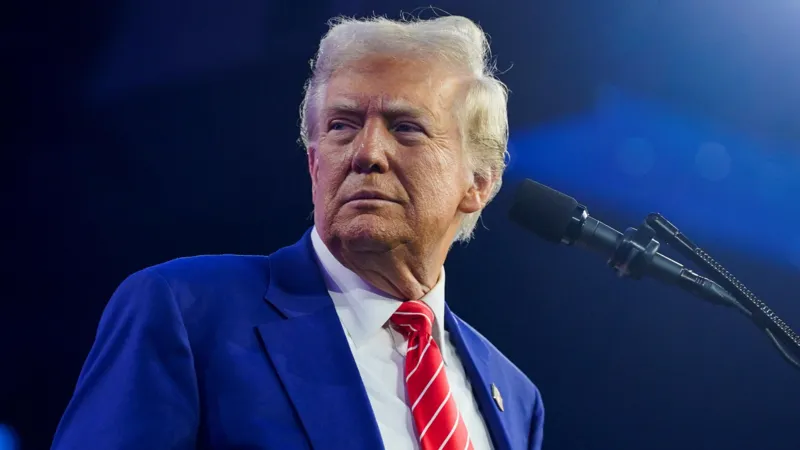
France & Germany Warn Trump Over Threat To Take Over Greenland: In early January 2025, tensions erupted when the incoming US President Donald Trump made controversial remarks about Greenland, a territory that belongs to Denmark but enjoys wide autonomy. Trump indicated that he was unwilling to rule out using military force to seize Greenland, a move that drew stern reactions from global leaders. Both German Chancellor Olaf Scholz and French Foreign Minister Jean-Noël Barrot were quick to respond, warning against any actions that would undermine the principle of territorial sovereignty.
Their remarks highlighted the deep concerns within the European Union (EU) and its member states about the implications of such threats. Chancellor Scholz was the first to publicly address the situation, emphasizing that “the principle of the inviolability of borders applies to every country, no matter whether it’s a very small one or a very powerful one.” This statement reaffirmed the position that all nations, large or small, are entitled to their territorial integrity under international law. Scholz’s remarks reflected the broader European stance on territorial disputes, especially in the context of rising global tensions and historical lessons from the 20th century.
French Foreign Minister Barrot also weighed in, expressing skepticism about the likelihood of the United States invading Greenland, but nonetheless stressing that the EU would not tolerate any violation of sovereign borders. “There is obviously no question that the European Union would let other nations of the world attack its sovereign borders,” he declared. Barrot’s words conveyed the European Union’s unwavering commitment to territorial integrity, signaling that any aggressive actions by the US in Greenland could result in a broader geopolitical crisis.
Trump’s comments regarding Greenland were not entirely new. In 2019, during his first term as president, he had suggested purchasing the island, drawing widespread criticism from Denmark and Greenland’s leadership. At the time, the Danish government had firmly rejected the proposal, stating that Greenland was not for sale. However, Trump’s recent comments seemed to revive the issue, suggesting that the island was “critical” for US national and economic security. He went on to describe Greenland’s strategic location as vital to military operations, particularly in tracking Chinese and Russian naval movements in the Arctic region.
The United States has maintained a military presence in Greenland for decades, with the Thule Air Base serving as a crucial radar facility since the Cold War. Given the island’s location near the Arctic, its strategic importance in global defense and security cannot be overstated, especially with the ongoing geopolitical rivalry between the US, China, and Russia. Trump argued that controlling Greenland would bolster the US’s ability to protect the “free world” by securing military and economic interests in the Arctic.
However, the response from Denmark and Greenland has been clear and unambiguous. Prime Minister Mette Frederiksen of Denmark reiterated that Greenland “belongs to the Greenlanders,” emphasizing that any decisions about the island’s future should be made by its inhabitants. She also noted that while Denmark valued its close cooperation with the United States, Greenland’s sovereignty was not up for negotiation. This sentiment was echoed by Greenland’s Prime Minister Mute Egede, who, although pushing for independence from Denmark, made it clear that the territory was not for sale. Greenland’s people, who number just 57,000, have long enjoyed a high degree of autonomy, but the island’s economy remains reliant on subsidies from Denmark, and it remains part of the Kingdom of Denmark.
Greenland’s status and its relationship with Denmark have long been complex. While the desire for full independence from Denmark has grown in recent years, particularly under the leadership of Prime Minister Egede, there is also widespread recognition that Greenland requires external support for defense, public services, and economic stability. This creates a delicate balance between the aspirations for self-determination and the practical realities of governance and defense.
Kuno Fencker, a member of the Greenlandic Parliament, echoed this view in a BBC interview, emphasizing that while there is an ongoing conversation about Greenland’s future, any decision about the island’s status must be made by the people of Greenland, not outside forces. Fencker pointed out that although many in Greenland hoped for independence, there was no desire for the island to become a colony of the United States or any other foreign power. The notion that Greenland might one day become an independent nation remains a long-term goal for many of its citizens, but this ambition must be balanced with the island’s ongoing reliance on Denmark.
The issue of Greenland’s sovereignty became even more pressing with Trump’s recent remarks, and international observers were quick to point out that such statements had the potential to escalate tensions. Senior international correspondent Steffen Kretz, reporting from Greenland’s capital Nuuk, noted that many Greenlanders were “shocked” by Trump’s refusal to rule out military action. He pointed out that while there was a desire for greater self-determination, Greenland’s population was generally not in favor of the island becoming a pawn in global geopolitical struggles.
The Danish government, while attempting to downplay the confrontation with Trump, was also privately aware of the potential ramifications. Kretz suggested that Denmark’s leadership was deeply concerned about the possibility of this issue becoming the “biggest international crisis” the country had faced in modern history. Given Denmark’s status as a member of NATO and its close ties to the US, this situation posed a diplomatic and security challenge.
In an unexpected twist, Donald Trump Jr., the president-elect’s son, visited Greenland on January 7, 2025, ostensibly for a “personal day trip” to speak with local people. This visit only added to the tension, as Trump Jr. posted a photo with a group of Greenlanders in a bar, wearing pro-Trump caps. While this could have been seen as a gesture to gauge public opinion, it was viewed by many as an attempt to further solidify the Trump family’s influence in the region, potentially undermining Greenland’s self-determination.
As the standoff over Greenland’s future continues, it remains to be seen how Denmark, Greenland, and the broader international community will respond to Trump’s provocations. While military action seems unlikely, the diplomatic fallout could have long-lasting consequences, particularly for US-European relations. European leaders, including Scholz and Barrot, have made it clear that any threat to territorial integrity will not be tolerated, but it is uncertain what concrete steps they might take to ensure the protection of Greenland’s sovereignty. Ultimately, the crisis underscores the delicate balance between global geopolitics, national security, and the rights of smaller nations to determine their own fate.

